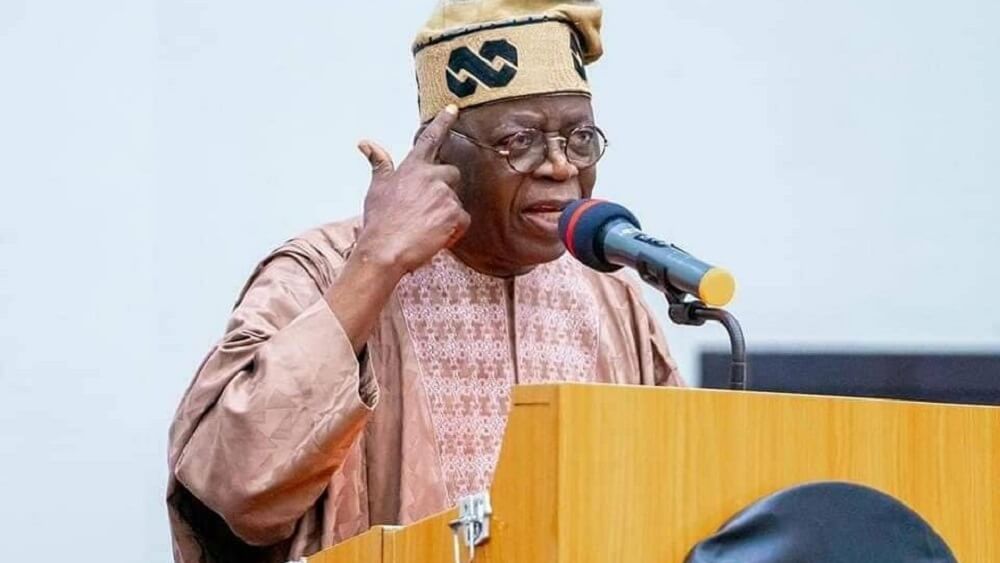The National Drug Law Enforcement Agency, NDLEA, has risen to the defence of President-elect, Bola Tinubu, listing grounds why it cannot prosecute the soon-to-be-inaugurated president of Nigeria in court.
This is contained in a preliminary objection to a suit instituted by the Peoples Democratic Party, PDP and the party’s governorship candidate for Kogi, Dino Melaye, at the Federal High Court in Abuja.
Advertisement
The litigants are seeking an order of mandamus to compel the NDLEA to arrest and prosecute Tinubu over alleged forfeiture of some funds in his bank accounts over his alleged involvement in drug trafficking.
Tinubu has denied any wrongdoing and his camp said it was a civil forfeiture and not criminal in nature.
But PDP and Melaye, a former senator representing Kogi West, said Tinubu, who was twice governor of Lagos State has a case to answer since funds traced as proceeds of narcotics dealings as filed in a US court were found in his bank accounts.
However, the anti-narcotic agent through its Director of Prosecution and Legal Services, Joseph Nbona Sunday, said the applicants “do not have a locus standi; they do not possess an interest peculiar to them and above the interests of all other Nigerians, the only underlying specific interest of the 1st Applicant then becomes political in nature.”
Advertisement
The PDP is listed as 1st applicant while Melaye is listed as 2nd applicant.
According to the agency, “Order of mandamus is an equitable remedy and should only be applied for in good faith and should not produce an indirect or underlying result.
“The Doctrine of Judicial Self-restraint precludes this Honourable Court from delving into matters with political colouration or matters aimed at getting direct or indirect political goals.”
The agency’s sworn affidavit in support of its preliminary objection made by its litigation officer, who’s the Directorate of Prosecution and Legal Services, Chia Cosmas Depunn averred, “That this suit as presently constituted does not confer the Court with jurisdiction.
“That the 1st Applicant does not have locus standi to institute this suit as it does not possess interest peculiar to it and above the interests of all other Nigerians.
Advertisement
“That the only peculiar interest of the 1st Applicant is to get rid of the 6th Respondent as a candidate of a rival political party.
“That the interest of the 1st Applicant is political in nature.
“That the 3rd Respondent is an independent Government Agency that has no political colouration or affiliation,” the agency said.
It further stated, “That the Court has a duty to insulate the 3rd Respondent from political controversies.
“That the suit is baseless, frivolous and brought in bad faith with the sole aim of achieving a political objective using the instrumentality of the Court process.
“That the facts and circumstances of the case require the Court to apply the doctrine of judicial self-restraint.
Advertisement
“That the 2nd Applicant is not an officer or executive or management committee of the 1st Applicant.
“That the 2nd Applicant has no locus standi to institute this suit as he does not possess any interest peculiar to him and above the interests of all other Nigerians
“That an Order of Mandamus is an equitable remedy.
“That the Order of Mandamus must be applied in good faith to promote the public interest.
“That the Order of Mandamus should not produce an indirect or underlying result,” the NDLEA said in its objection.
The agency listed via the affidavit that having gone through supporting judicial proceedings and noted, “That the matter was a civil forfeiture proceeding in the case brought by the United States of America as plaintiff against certain accounts held in the name of the 6th Respondent.
“That the object of the suit was to forfeit the funds or a certain part thereof in the said accounts as proceeds of illicit traffic in drugs.
“That the suit was not taken out against the person of the 6th Respondent.
“That the suit was not a criminal indictment or charge.
“That the standard of proof in civil forfeiture is based on the balance of probabilities.
“That the standard of proof in a criminal indictment, charges and proceedings is proof beyond a reasonable doubt.
“That the burden of proof in criminal procedure is much higher than that of civil procedure.
“That the Orders of the United States District Court of Illinois delivered by Magistrate Judge John A Nordberg in Suit No. 9C4483 relating to the release of the funds held in CitiBank N.A. and CitiBank International which funds were the 2nd and 3rd Defendants in the suit were made “with prejudice”.
“That the Orders of the District Court in the Citibank Accounts places a barrier on any further proceedings relating to the Account.
“That only the Orders relating to the funds held in Heritage Bank where the sum of $460, 000.00 was forfeited was made simpliciter and without a caveat.
“That the Orders made by the US District Court of Illinois were made to incorporate “the stipulation and Compromise Settlement of Claims to the Funds Held by Heritage Bank and Citibank” earlier filed by the parties in Court,” it said.
Consequently, it argued, “That the judgement of the US District Court of Illinois put an end to issues relating to the forfeiture and release of funds as contained in the Settlement Agreement.
“That the cause of action for mandamus requesting the 3rd Respondent to investigate and prosecute the 6th Respondent is founded on the judgement of the District Court of Illinois which has put the matter to rest.
“That the cause of action of the Applicants is dead and legally unsustainable.
“That it is in the interest of justice to dismiss this suit with substantial cost.”



